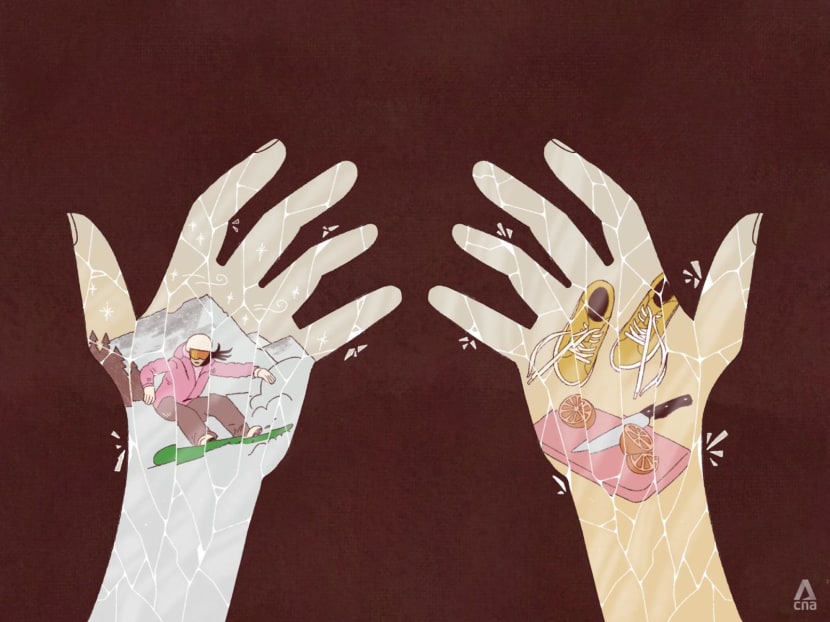How my eczema taught me that there's no shame in giving up some dreams to take care of myself
CNA's Kora Fong has struggled with eczema for more than 10 years, but in January, her condition took a turn for the worse. She shares how she is coping with the new complications.

In January 2025, strange-looking blisters appeared on Ms Kora Fong's hands and it became painful for her to do anything from snowboarding to even simple tasks such as tying her shoelaces. (Illustration: CNA/Nurjannah Suhaimi)

This audio is generated by an AI tool.
In April 2023, I was looking forward to my first-ever snowboarding trip. I had wanted to do it for a while, but had always put it off because I had reservations with dry weather – a necessary caution for me due to my eczema.
Eczema first appeared on the skin around my eyes when I was 16. Later on, I was diagnosed with atopic dermatitis on other parts of my body. The usual suspects would be the crooks of the elbows, behind the knees, armpits – any areas of the body that are extra susceptible to trapped perspiration.
Earlier this year, I was also diagnosed with dyshidrotic eczema, also known as pompholyx eczema. It manifests on the hands and feet, and is associated with excessive hand-washing, use of sanitisers and emotional stress.
Mine manifests on my hands and is exacerbated in dry weather. Because of that, spending 10 days in the snowy mountains is a lot less fun for me than for the average person.
Nevertheless, I had the belief that I could do anything as long as I put my mind to it. I decided I wouldn’t let anything stop me from checking snowboarding off my bucket list, so I booked my plane ticket to France.
Each day, we went for snowboarding lessons, and each evening, I would wince in the shower, trying to wash my hair with my cracked fingertips.
When I went to bed each night, I would carefully position my hands palms facing up so I wouldn’t dirty my sheets with the sticky moisturiser I slathered on to heal and soothe my inflamed skin.
Honestly, the trip was great and I made many new friends, but I spent all 10 days smiling through my pain – my constant, relentless pain.
I still believed I could do anything I wanted if I put my mind to it.
However, on that trip, I realised: just because I can, doesn’t mean I should.

When I returned to Singapore, my energy levels crashed. I had to spend a few days “hibernating”, recovering the physical, mental and emotional energy drained from me over 10 days of coping with my aggravated skin problems.
So much for a holiday.
ALL DAY, EVERY DAY
Eczema is fairly common in Singapore, affecting one in five children and one in 10 adults. I’m just one of hundreds of thousands that suffer from this condition – and this number is only increasing with each year.
For more than 10 years, eczema has been a constant (if somewhat inconsistent) presence in my life. Then, as I grew older, I started noticing that it was taking longer to heal between flare-ups.
In 2021, at age 26, I had yet another flare-up on my hands. I defaulted to my usual management strategy – topical steroid creams and moisturiser.
Two to three years on, I realised that my skin had never seemed to fully recover. It was only getting worse each time.
In January this year, strange-looking blisters called vesicles started appearing on my hands, taking my discomfort to a new peak.
Getting on with my life became cumbersome and painful. Even the simplest of tasks became agonising ordeals – tying my shoelaces, preparing meals, cleaning and so on.
The worst was whenever I had to wash my hands or take a shower. Water and soap would seep into the cracks on my fingers and hands, and every single time, it would sting and burn.
On top of this, my hands itched several times throughout each day. I had to start dedicating more energy to just ignoring it; a simple lapse in willpower might result in me scratching and breaking my skin.
I often find myself unable to control myself in sleep, so when I wake up the next day, I feel a wave of guilt but also lethargy.
I have to force myself to stay alert throughout the day, to get through my tasks at work or at home. I become more anxious when my condition worsens, which makes it even harder to heed my doctor’s advice to avoid stress.
Enduring this discomfort every single day sapped my energy and left me exhausted and empty. When I was younger, I would tell myself that I just needed to “push through” it, but that only led me to burnout.
Nowadays, I’m much more prudent with my stores of energy.
Still, it’s easy to fall back into the trap of thinking that I need to be more productive, that I need to push myself to the limit to achieve more.
After all, so many narratives in the public eye seem to exalt such actions.
A HEAVY BURDEN TO BEAR
The reality is that eczema, as well as countless other chronic illnesses, places a huge mental load on sufferers, affecting and shaping their lifestyles.
The cognitive and emotional effort involved in managing daily life, especially household chores, multiplies manifold but remains invisible.
I’d read about other patients with very severe eczema who need round-the-clock care, special baths and a cocktail of pills to even survive. Influencer Tammie Ong doesn’t have eczema, but has several other incurable, chronic conditions – she even has to ingest nutrients through a tube.
I can scarcely imagine the mental load that she and other chronic disease sufferers have on top of the toll exacted by their physical impairments and debilitations.
When I cook, I have to take extra effort to find recipes that require minimal preparation. In buying groceries, I fork out more for pre-chopped ingredients to avoid having to handle and wash them too much.
I try to stick to exercise options that don’t require me to use my hands a lot – standing HIIT workouts, for instance, or stair training.
I had to get a strap to carry my mobile phone everywhere with me, for the days when digging into my pockets is simply too painful.
And of course, I worry often about costly medical fees.
All this greatly frustrated me at first. Now, I’m learning to come to terms with my new reality and focus on the positives.
I’m aware that I’m in a much better position than many others, for instance. I count myself lucky that there are varied treatment options that are accessible to me and that I’m able to work in an air-conditioned environment.
My loved ones patiently support me and pick up the slack – my mother and grandfather always pack extra portions of food for me when I visit, and my partner pre-cuts my fruits and veggies so I can have easy access to them.
I’ve also learnt to start celebrating my own efforts, no matter how small the task seems. I’m learning to applaud myself for keeping my spaces clean and for working out even though I could easily call it a day on account of my eczema.
One of the advantages of being stubbornly determined is that it still doesn’t completely stop me from doing what I want.
At the start of this year, I went on my second snowboarding trip.
It was a lot more painful than the first, given that my eczema has intensified over the last few years. Everything was worse: Showers were more unbearable, the dry air seemed to siphon moisture out of my skin even through layers of moisturiser, and I had many teary fits of sheer frustration.
Strangely enough, I still don’t regret it.
I’m sure it won’t be the last snowboarding trip of my life, but for now, it is goodbye.
I can look forward to the many other new experiences awaiting me in future, but in the meantime, I need to focus on taking care of myself.
There’s no shame in listening to my body and letting go of something I want to pursue so I can care for my well-being.
Kora Fong is a digital analyst at CNA Digital.
If you have an experience to share or know someone who wishes to contribute to this series, write to voices [at] mediacorp.com.sg with your full name, address and phone number.













